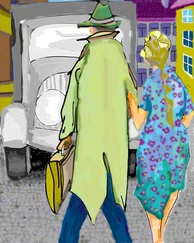That was why he clung so fiercely to Jeremy — the only man who loved him, the only one who ever had or ever would. And when the anaphylactic siege was over (he self-hated for flashing that he was in Derek’s arms, not Jeremy’s), Tristen stole to the den to gather his thoughts. He swallowed a handful of pills and read the email again until he felt nothing. An hour passed and he left without Jeremy knowing.
He was on his way to kill him, Beth too if she was there, and then himself.
—
Beth needed help — Derek’s breathing was labored but he wouldn’t let her call 911.
To make matters worse, she thought he’d been doing blow. She had no idea where he would have gotten that, probably an old stash. With his heart the way it was, doing coke was the same as suicide, which is what she was beginning to think was the plan. Before Larissa rushed over, Derek had been fixating on whether the IATSE insurance hack would “hold,” and kept calling his son. When he finally got through, he said Tristen went all crazy and hung up on him.
Larissa wasn’t in such great shape herself.
A few weeks ago, while orgying with Tessa and the putative billionaire, she got a text from Allegra saying she was “uncomfortable with what we’ve been doing.” Too blazed to respond, she shut off her phone. In the morning, Larissa wondered if she’d imagined it, but no: Allegra was breaking up with her. Which probably meant she had already confronted Dusty about having betrayed her with the camera double… the earring in the bed, the this, the that… ugh and oy . A friggin’ nuclear situation. While part of Larissa was glad (she seemed to have reached an impasse over what to do with the monster she’d created), she was devastated too because one bright, euphoric morning she awoke to realize she was head over heels in love with the movie star’s old lady. She wondered how the fuck that happened, but there you have it. When Allegra blindsided her, she grew sleepless and obsessive, stalking the house on Carla Ridge. What began as an impromptu goof — an angry, nutzoid, bizarrely innovative payback for how Dusty had scorned her — had seriously backfired. She was grievously wounded and painfully alone.
She was in bed when Beth called, spooning room-temp Häagen-Dazs Rocky Road into her mouth and masturbating to the nightlight of an MSNBC Lockup marathon. She decided not to wake Rafaela because she wouldn’t be gone all that long — they’d drive Derek to the hospital and that would be that. The paramedics might get there before she did, anyway. (She called them herself when Beth said Derek had forbidden her.) Tristen was at his boyfriend’s. The idea of alerting him only occurred in light of the men’s recent détente, but she demurred; as much as it warmed her, she didn’t trust all the happyface fence-mending, at least not on Derek’s side. When Beth later mentioned something about Tristen raging on the phone at his dad, Larissa was actually heartened. It was about time he got angry.
Maybe he was growing up.
—
The next evening, he kept his appointment.
This time they were by themselves, as her guru was recovering from a head cold. She chose Denny’s because she said they had the best fried chicken and she loved the Googie architecture. When Devi asked after “the marvelous boy” (who had also been invited), Jeremy said he had tried to reach him. He really had; but Tristen was worrisomely out of touch.
Without much ado she offered a summary of her fateful encounter with the portly sidewalk saint, succinctly recapping the history of all that led up to it — culminating in the long walks taken while her daughter lay in the hospital. When she first discovered the man who was to be her guru and protector, he was at rest upon a swatch of cardboard, hard by the fashionable Gold Coast establishment known as Mandry’s. They spent time together and she told him about her life. Then one day he cryptically announced, “It’s all over, because now they know . The contract is magnificently broken,” and in the next moment the two were at her precious Bella’s bedside, where the poor thing died soon after. She recounted the mysterious ease with which “my Sir” contrived a burial that was both humble and fitting for a princess — its million bells resounding — at costs marked paid and unknown.
“I’ve sat at his feet now, as I’ve said, for seven perfect years. He’s given me life and shown me death and now we are leaving for that third place — I should say he is leaving and I hope to have courage enough, silence enough, to follow. Like myself, Sir is an inveterate rover, yet on a Promethean scale. In his day he thought nothing of swallowing hundred-mile walking tours whole; alighting in whatever far-flung city where his business had taken him, he’d set out on more compact versions, to shake off the crampiness of planes, trains, and automobiles. On one such restorative jaunt in Chicago, destiny brought him to Mandry’s, a hip neighborhood gastropub of the type summarized in local guides by the symbols of crossed knife and fork, martini glass, and triple dollar sign. While my Sir is and always has been a teetotaler, he’s a prodigious observer of people . He was drawn to the place; more about that in a minute. If you’re curious about his ‘background,’ well, so am I, and I’m afraid I can’t help you much. I know little about his life as a ‘householder’—it’s not something he dwells on, so I don’t either. He has told me that he used to reside in Minnesota with his wife and only child. I believe they were married thirty some-odd years. Their son was mentally impaired, though as gentle a soul as one would ever meet. Again, Sir told me this himself.
“On those urban walks that I described, it was my guru’s pleasure to dodge into watering holes of both high and low character. Once inside, he’d lean against a wall and people-watch, smiling at whosoever passed by while formulating some astonishing new idea from which hundreds of jobs and untold millions in revenue would soon be created. On the final night of his trip to the Windy City, it was close to two a.m. He was on the dregs of a ramble that would be his last before returning home; as he turned into Mandry’s, a bouncer barred his entrance. ‘They’ve called it,’ said the man. ‘You can’t go in. Last call. ’ Wishing to defuse the surliness and even potential violence he perceived were at hand, my Sir lightheartedly said, ‘Oh, that’s all right, I’m not drinking.’ ‘You better believe you’re not,’ said the thug. ‘Not tonight!’ And with that, he leapt in front of my guru and barred the door, snarling, ‘The last time I let you in, you asked every woman in the bar if they’d fuck you.’
“I won’t dignify such ugliness with a rebuttal or defense of my teacher’s spotless character. I will say that until that evening, he’d never laid eyes on Mandry’s or its tactless guardian. But what is of paramount importance here is that for the first time in his life, Frank MacKlatchie became so enraged that he entirely failed to recognize the man — himself! — who, as a result of those ill-spoken words, directed the blast of a high-pressure fire hose tirade at the bully who’d so casually slandered him. (I had almost forgotten that my Sir encouraged me, in telling this story, to use the name he went by before he was ‘transformed’—Franklin MacKlatchie, Esquire.) Now as it was last call, customers began to pour from the front door; the bar was on a corner so that cars were poised at the stoplight and their passengers watched the embarrassing altercation for sport. It may have been just the sort of ‘colorful’ rowdiness that would have captured my guru’s attention himself, had he not been a star player in the spectacle… and then suddenly, as if deflated by a pin, the accuser dared to apologize! Without looking Frank MacKlatchie in the eye, he begged pardon, humbly admitting that it must be a case of mistaken identity! Which was the same as trying to unring a bell that’d been struck by lightning. The remorseful thug went on to remark upon the uncanny physical resemblance between my noble, my delicate Sir, and some other terrible fellow who’d made trouble some while back.
Читать дальше












